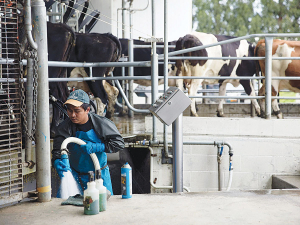Upper North Island Storms: Limited impact on dairy farms
For the most part, dairy farmers in the Waikato, Bay of Plenty, Tairawhiti and the Manawatu appear to have not been too badly affected by recent storms across the upper North Island.
 The ongoing problem of labour shortages occupies the minds of dairy farmers, says James Allen, AgFirst.
The ongoing problem of labour shortages occupies the minds of dairy farmers, says James Allen, AgFirst.
The availability of quality labour remains the number one issue for many dairy farmers.
That's the view of AgFirst chief executive and dairy consultant, James Allen who says while compliance issues tend to dominate the headlines around the dairy sector, it's the ongoing problem of labour that occupies the minds of dairy farmers. He says any ideas that help resolve the labour issues are being looked at seriously by dairy farmers.
"That includes milking frequencies such as once a day milking or ten in seven or three in two," he says.
Allen says they have a number of clients who are saying "can we review their farm systems and does that mean they shift to a lower input cost system".
"I wouldn't say it's a wholesale change but there does seem to be a bit of trend towards that rather than going the other way. If you could pick a trend, is it high or low input, it's trending down rather than up," he says.
Another factor of concern to farmers is their financial position and he says AgFirst forecast this some time ago. He says there has been some massive cost increases and people have just put on their spring fertiliser, cut their silage and done their cropping programme. He says as a result there's been a lot of expenditure in the last couple of months.
Allen says at the same time interest rates have increased and many farmers are facing some pretty significant tax bills from the previous year.
"So, it's all coming to a head at once and cash flows are reasonably tight on many farms."
Commenting on the current season, Allen says it has been late and there have been "some unusual things happening".
He says dairy production is certainly behind last season and most regions have had a pretty challenging spring, which has been characterised by heavy rain and a lack of sunshine. Allen says as a result there wasn't much silage made until late into December and that was probably an indication of just how tough the season has been.
"A number of maize and forage and brassica crops had to be re-planted because it was so wet in a number of areas. The only region that seems to be enjoying the season so far is Southland which, by and large, has had a great season and from what we hear they are looking for a little bit of rain at the moment," he says.
Allen says Fonterra is indicating a crop in milk production and that is consistent with what his people are seeing. He says, on the positive side, most areas have had some pretty good rainfall in the past week or so and that bodes well for January/February production. The hope is that production can be maintained without having to feed out too much supplementary feed. He says with the good weather, a lot of late silage and hay is being made.
While Allen concedes it's challenging times for dairy farmers, with a lot of negative talk, he says there is still a lot of positives and opportunities. He says one of the indicators of this may come in the following weeks when news about farm sales becomes clearer. He says up until now there have been both good and poor sales, but there is hope that things will improve.
The 5+ A Day Charitable Trust has launched a collection of affordable recipes designed to turn everyday vegetables into seasonal stars.
Jane Mellsopp has been confirmed as the new Government Appointee to the New Zealand Meat Board (NZMB).
To celebrate the tenth anniversary of its annual Good Deeds competition, Rabobank will give away $100,000 to improve rural community hubs, schools, clubrooms, and marae across New Zealand.
Agricultural and veterinary product supplier Shoof International has appointed Michaela Dumper as its new chief executive.
Federated Farmers is celebrating following the Government's announcement that young farmers will be able to use their KiwiSaver funds to buy their first home or farm.
The Meat Industry Association of New Zealand (MIA) today announced that Chief Executive Officer Sirma Karapeeva has resigned from the role.
OPINION: Staying with politics, with less than nine months to go before the general elections, there’s confusion in the Labour…
OPINION: Winston Peters' tirade against the free trade deal stitched with India may not be all political posturing by the…